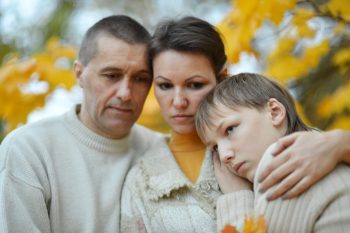Lorelie Rozzano is a guest blogger for Vertava Health.
7 Things You Should Know About The Addicted Person’s Family
— If you’ve never loved someone who struggles with addiction, you’re lucky. You’ll never know the horror of waiting for that one phone call. The one that tells you the person you love is gone forever. You won’t know how it feels to stand by helplessly and watch the child you gave birth to self-destruct or what’s it’s like to wonder if this night is their last. You won’t know what it’s like to say ’I do’ to the man or woman of your dreams only to find out they have a new love, one that is greedy, toxic and killing your relationship. You won’t know how scary it is to see mommy or daddy passed out and not able to care for you. You won’t experience what it’s like to walk on eggshells every day or hold your breath for fear of saying the wrong thing. You won’t know how lost you get in loving someone who struggles with addiction, or how you will grieve for the person they once were. You can’t possibly imagine the anxiety families feel or how exhausted and heart-broken they really are. [lorelie-callout] Addiction is defined as a disease by the American Medical Association and the American Society of Addiction Medicine. However, many are baffled by addiction because it’s a disease that acts like no other. Most people don’t understand this illness. Those struggling with addiction don’t understand it any better than their families do. Families get up each and every morning with one thing on their mind – how to save the life of their addicted loved one today. They are not weak-willed or push-overs. They love deeply and hurt badly. So before you judge them, here are seven things you should know.
Families with addiction are people like everyone else.
One in seven families will experience addiction. They’re your neighbors, your co-workers and your friends. All families have their cross to bear. Some have cancer, other diabetes, some divorce, and some have disabilities you can’t see like mental health issues or addiction.
It’s not the families fault.
While families can influence susceptibility through the environment, they can’t cause someone to have an addiction. Just as many addicted persons come from loving, nurturing families as they do from abusive, neglectful ones. Addiction is a brain disease. The changes in the brain’s wiring are what cause people to have intense cravings for the drug and make it hard to stop using. Brain imaging studies show changes in the areas of the brain that relate to judgment, decision making, learning, memory and behavior control. Simply put, addiction is a disease that if left untreated can be terminal.
Families beat themselves up.
Loving a person struggling with addiction is one of the most difficult things you will likely ever face in your life. You ride an emotional roller-coaster of ups and downs. Your well-being becomes tied to your addicted loved one’s health and happiness. Families try everything in their power to save, fix, rescue or control their sick loved one and when they can’t, they feel ashamed and beat themselves up.
Families also have addicted behaviors.
When you love someone struggling with addiction, it’s normal to feel concerned. Left unchecked, concern crosses the line into all-consuming obsession. What once was healthy worry becomes an obsession. Families fixate on ‘helping’ their sick loved one get well by softening their blows. They do this through enabling behaviors. Enabling means you support the addict in a way that removes the consequences of their actions. Enablers feel guilty when they say no. They find it easier to give in and say yes than feel their feelings of guilt and unease. Addicted persons use drugs and alcohol for relief and enablers say yes for the same reason.
Families get sick, too.
To stay in a relationship with someone struggling with addiction you must make compromises. Things you once said you wouldn’t live in, become your new normal. You make excuses for abusive and neglectful behavior. Families live under extreme stress resulting in physical, emotional and psychological breakdown. Families may also experience PTSD symptoms. Without support, families can become equally as sick as their addicted loved ones.
Families want the addicted person to get well, but don’t always look after themselves.
Families struggle to be in control. They give their addicted loved one the best advice in the world, but unfortunately, they don’t always follow it. Families can become lost in addiction. They are so focused on their loved ones decline, they don’t always notice their own.
Families are afraid of being judged.
Deep down families have feelings of shame and guilt. Due to this, many don’t talk about their loved one’s addiction because if they do, they may be told to leave their family member or kick them to the curb. Unless you’ve been in their shoes, you can’t understand how difficult and complex this situation really is. The public points fingers at them. Their children are called junkies or losers. Families are afraid of being judged and may keep addiction a family secret. — Although you can’t make your sick loved one well, you can greatly influence the outcome by starting your own healing journey. Addicted persons whose families are educated and in recovery too have a far greater chance of succeeding. Even with addiction in the family, a beautiful life is possible. If you know a family struggling with addiction you can help them through listening and by encouraging them to reach out for support. If you or someone you know needs help, please call this confidential support line for assistance. 1-888-614-2379.


